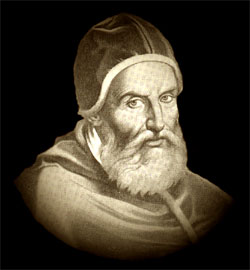The relationship between Coffee and the Pope?
Since the 15th century, coffee has been grown in large quantities in the Arabian Peninsula, and the whole Muslim world is enjoying the so-called "gift of Allah". More and more Europeans exploring Arabs in the Middle East are curious and record the story of coffee. Slowly the merchants of Venice began to use their brains and started the re-export business of coffee.

However, the Arabs were on ten alert at first, after all, it was their "divine fruit", so they refused to export it to the Europeans. The entire Arabian Peninsula only passes through Yemen at the southern end, and since the Turks occupied Yemen at that time, it was shipped to Venice in Europe through the port of Mocha in Yemen in the 16th century.
When coffee began to be introduced into Europe, it was not very smooth at first, mainly due to religious contradictions. Don't forget that coffee is the "divine drink" of Muslims in the Arab world, so when Venice merchants shipped coffee to Europe, they were attacked by Italian clergy and boycotted in horror. It is regarded as "Arab opium" and "the masterpiece of the devil Satan".

Pope Clement VIII (Pope_Clement_VIII)
At the beginning of the 17th century, many bishops and priests jointly wrote to the pope, advocating the expulsion of this pagan "black poison" from Italy. In order to quell public opinion, Pope Pope_Clement_VIII VIII decided to taste it himself. When he drank it, he could not help praising: "what a pity it would be if the believers could not enjoy this Satan's drink!" Let me baptize it and make it a drink of God. "it is this enlightened pope that enables Europeans to enjoy the delicacy given by nature!
Important Notice :
前街咖啡 FrontStreet Coffee has moved to new addredd:
FrontStreet Coffee Address: 315,Donghua East Road,GuangZhou
Tel:020 38364473
- Prev

Basic knowledge of Coffee and Japanese Fine Coffee Culture
As early as the end of the 17th century, the Dutch brought coffee to Asia in the early 18th century, and coffee was soon introduced to Japan. Before and after the Meiji Restoration, Japan advocated total westernization, and the coffee culture with Dutch flavor took root in Japan. During the Taisho period (1879-1926), due to the pervasive atmosphere of freedom and democracy, fresh and luxuriant culture, cafes have been very prosperous. But with the Japanese army,
- Next

Coffee experience Coffee contact process of Chinese people
Speaking of my first contact with coffee, I'm afraid I have to talk about it since I was a child. From the beginning of my learning, I remember that my mother would make this cup of black water. My mother grew up in East Africa, the birthplace of coffee, and didn't come back to China until she was a teenager. Coupled with the fact that my father stayed abroad when he was young, their combination made the family have a habit of drinking coffee all the time. When we were young, our mother made us milk.
Related
- How did the Salvadoran coffee industry develop in Central America?
- What exactly does the golden cup extraction of coffee mean?
- The Origin of Coffee flower
- [2023 Starbucks World Earth Day] there are more meaningful things besides free Starbucks coffee!
- What kind of coffee is there in Spain? 9 Flavors of Spanish Coffee
- Aromatic African coffee| Kenya's coffee culture and historical production area
- Liberica Coffee Bean knowledge: the characteristics of Liberian Coffee beans of the three original species of Coffee beans
- The origin and formula of Spanish latte introduces the taste characteristics of Bombon coffee in Valencia, Spain.
- How to adjust the solution of over-extracted coffee
- What is the tasting period of coffee beans? What is the period of coffee and beans? How should coffee wake up and raise beans?

